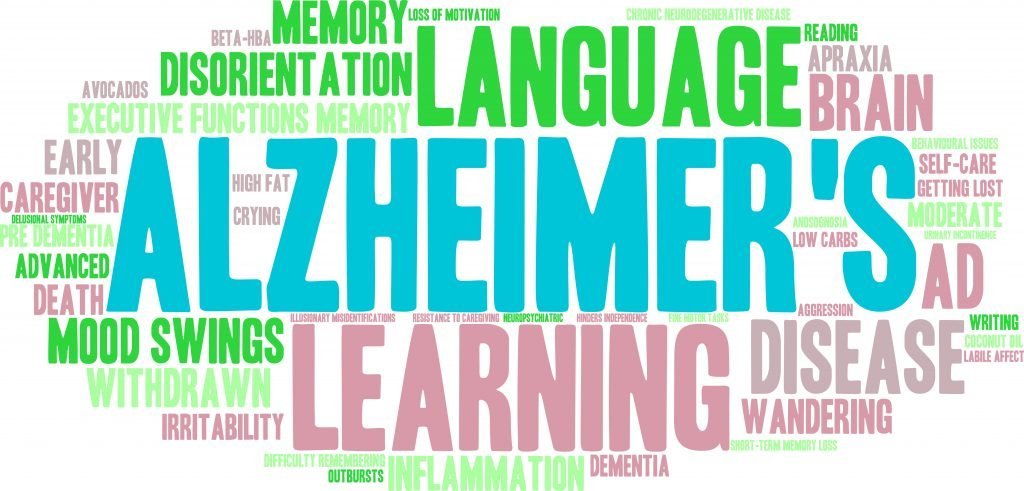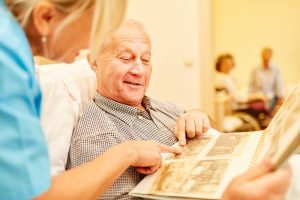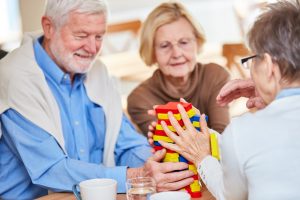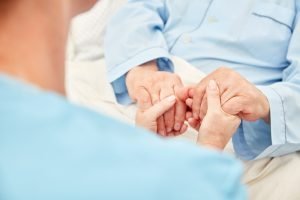Alzheimer’s disease is a difficult diagnosis for families to receive. It takes a toll on the senior who is living with the illness, and their family caregivers. But when your aging loved one doesn’t realize they have Alzheimer’s disease, the difficulties are even greater.
Medical experts call this condition, Anosognosia, and researchers believe up to 81% of people with Alzheimer’s disease have it. Seniors who are living with Anosognosia have no idea something is wrong with their cognitive function.
When a senior diagnosed with Alzheimer’s or other dementia is unable to recognize their own cognitive status. this can pose a bit of a dilemma for their caregivers. When Alzheimer’s is coupled with anosognosia, there also comes a limited capacity for insight into and acknowledgement of the true ability to perform activities of daily living.
Unicity Healthcare understands the role of caregiver and how difficult it can be to navigate on your own. Below we will help explain what anosognosia is, as well as provide useful information on assisting and supporting your loved one living with Alzheimer’s disease.

The Definition of Anosognosia
The term “anosognosia”is quite difficult to define; however it is used to describe when your senior loved one presents a lack of awareness about having dementia or Alzheimer’s impairment. Dementia patients can be selective as it pertains to their memory, general thinking skills, emotional and physical limitations and may explain away the symptoms of their disease with general excuses such as just being forgetful or fatigued.
Anosognosia makes it even more challenging to reason with a loved one, especially when it comes to gaining their cooperation with physician interventions. Because these seniors don’t see any signs of their illness, they may refuse to cooperate with adult children and caregivers.
It is very difficult for caregivers and family members to make progress with a person’s illness when a loved one is showing signs of anosognosia. Yet, the condition is alarmingly common
Why Anosognosia Occurs
Anosognosia is still difficult to define, but researchers know it results from physical, anatomical changes or damage to the part of the brain that affects perception of one’s own illness.
Alzheimer’s experts believe anosognosia occurs when the frontal lobes of the brain become damaged or deteriorate. This area of the brain is responsible for abstract thought, problem-solving, perception and socialization skills. When this part of the brain doesn’t function as it should, the left side of the brain becomes more dominate. The brain develops its own techniques for compensating for the loss of function. Denial and rationalization are two. They make a person living with Alzheimer’s believe they are really doing just fine.
Is It Anosognosia or Denial?
Anosognosia may be complete or selective. They may be entirely unaware of their impairment for instance, or they may even react with anger and defensiveness if confronted about their illness. This makes it difficult to diagnose anosognosia, and tough to differentiate it from simple denial.
Here are some signs you can look for if you’re worried a loved one might have dementia with anosognosia:
- Not keeping up with regular daily tasks or personal hygiene
- Difficulty managing money or bills
- Being more spontaneous or less inhibited in conversation without concern for their own behavior
- Becoming angry when confronted with forgetfulness, lack of self-care, or poor decision making
- Confabulation: making up answers they believe are true, though sometimes the details may be imaginary, may pertain to something that happened in the past, or even something they read or heard elsewhere
The lack of awareness associated with anosognosia differs from the shock and denial that many individuals and families experience following an initial diagnosis. Changes in the brain cause individuals with mental illness, brain tumors, stroke, Alzheimer’s disease and other forms of dementia to truly believe that there is nothing wrong with them
A senior’s lack of awareness of their impairment can be selective or complete, and it can pertain to their memory, general thinking skills, emotions and physical abilities. A dementia patient may experience occasional difficulty with language skills, like word-finding and vocabulary, but they may explain away these situations with a general excuse about forgetfulness or fatigue. Someone who has anosognosia regarding short-term memory problems, like forgetting to bathe, missing appointments, or leaving food on the stove, will typically insist that they do not need help and are fully capable of performing daily activities independently despite clear evidence to the contrary. They may also react with anger when reminded of their mental impairment, because they are fully convinced a deficit does not actually exist.
Alzheimer’s disease care involves seeking assistance to diagnose the suspected problem, and creating a plan of action to be sure the person remains safe and healthy, while maintaining dignity and social engagement.
Caregiving and Anosognosia
For dementia caregivers, anosognosia can be more challenging to deal with than your loved one’s actual memory loss. Some patients are so convinced they’re healthy that they may even refuse medical evaluations, treatments and medications. When someone living with dementia or Alzheimer’s does not acknowledge their diagnosis, or want assistance, intervention of some kind is usually necessary. If not treated, a loved one could even put themselves and others in danger.
Whether your loved one is in denial of their anosognosia, Alzheimer’s or dementia, the most effective caregiver strategy is one of mitigation of the effects, rather than trying over and over to make the person understand. Trying to make someone with this problem understand that they have changed and need to accept new limits often is an exercise in frustration.
The following tips may help family caregivers better relate to their loved one with Alzheimer’s disease and anosognosia:
- Use positive approaches to communication: be gentle, encouraging and empathetic about necessary tasks
- Provide a structured schedule of tasks, personal care and down time, and make yourself or another caregiver available to help
- Downsize any responsibilities that are unnecessary: sometimes a home health care aide or memory care is the answer
- Work together with the person on necessary tasks such as cleaning or money management
- Stay calm and focused on the other person when voicing concerns: articulate your thoughts in a subtle and positive light
- Limit caffeine and sugary treats that may create agitation.
- People with Alzheimer’s disease benefit from structure because it prevents them from having to rely on memory. Try to create and stick to the same daily routine whenever possible.
- Focus activity such as errands and appointments in the morning hours when they are likely to be better rested.
- For your Alzheimer’s loved one’s safety and your own piece of mind, investigate GPS tracking options
Anosognosia, and other effects experienced by Alzheimer’s patients, such as sundowning, challenging behaviors, wandering, and aggression, can be very overwhelming, both for the person fighting these issues and his or her loved ones. It’s important for family members to look for a strong network of support and to educate themselves as much as possible about the disease and strategies for coping. It’s equally important for family members to reserve sufficient time for self-care.
Memory Care At Unicity Healthcare
Alzheimer’s and Dementia Care is our specialization at Unicity Healthcare. We know that it is essential that care be supervised and adjusted at each level of Alzheimer’s disease: the early stage, the middle stage and the late stage. Our Senior Advisors make sure to guide you through the appropriate care alternatives during the progression of the disease.
You can benefit from the expertise of our experienced Senior Advisors if you are concerned about a loved one and don’t know what to do and where to turn. If you are considering a change regarding the living environment of a loved one, we can help.
When the time comes to consider home care for your loved one, you may seek help from Unicity’s qualified home care professionals to help ease the burden.
For more information please contact us at:
Email: info@unicity-ec.com
Explore Unicity Healthcare’s website: www.unicity-ec.com



